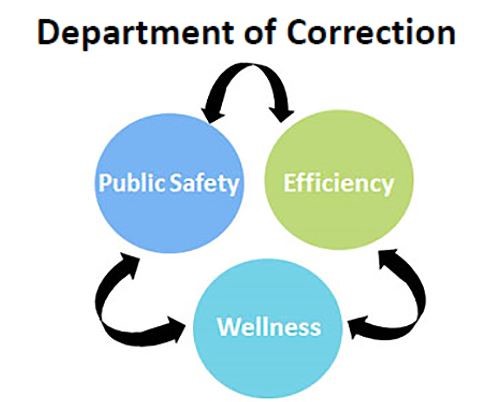Correctional Counselor Supervisor
All Facility Locations
Recruitment #190111-2261SC-001
| Date Opened | 1/17/2019 11:50:00 AM |
|---|---|
| Salary | $77,613 - $102,544/year |
| Job Type | Open to Agency Employees |
| Close Date | 1/31/2019 11:59:00 PM |
Introduction

The State of Connecticut, Department of Correction is recruiting for full-time Correctional Counselor Supervisors in Addiction Services at all correctional facilities statewide. Final locations are TBD. These positions supervise Correctional Substance Abuse Counselors - per Special Requirement #1 listed below, candidates are required to possess and retain current Certification or Licensure as an Alcohol and Drug Counselor by the Connecticut Department of Public Health.
Candidates must possess this Certification or Licensure at the time of application.
Selection Plan
In order to be considered for this job opening, you must be a current State of CT employee of the Department of Correction, who has permanent state status*, and meet the Minimum Qualifications as listed on the job opening. You must specify your qualifications on your application. *For employees in the classified service, permanent status is obtained after successful completion of a working test period. For employees in the unclassified service, permanent status is obtained after serving in a position for at least six months (full-time or full-time equivalent).
During the recruitment process, applicants may be required to submit additional documentation supporting their qualification(s) for this position. These documents may include: performance reviews, supervisory references, college transcripts, licensure, etc. at the discretion of the agency.
Please ensure that your application is complete. You will be unable to make revisions once you officially submit your application to the State of Connecticut. Candidates who submit an untimely, incomplete or inaccurate application will not be considered for this employment opportunity.
Should you have questions pertaining to this recruitment, please contact Jim Faulkner at james.faulkner@ct.gov.
PURPOSE OF JOB CLASS (NATURE OF WORK)
In a Department of Correction facility or community setting this class is accountable for supervising the counseling and classification function of an inmate treatment program.
EXAMPLES OF DUTIES
Supervises assigned and adjunct staff including orientation, training, counseling, evaluation and discipline in accordance with departmental standards; determines priorities and assigns unit duties, oversees and reviews results for accuracy, effectiveness and consistent application of policies and procedures; provides staff training and assistance; conducts performance evaluations; studies, analyzes and evaluates tasks performed by staff; ensures appropriate case management including screening of eligible inmates for programs; researches, organizes, plans and directs inmate counseling and classification program including supervision of records function and staff; coordinates activities with parole and community services system; organizes and develops admission and pre-release orientation programs; serves as executive officer of Classification Committee; participates on interdisciplinary teams; counsels individual inmates with difficult problems; works collaboratively and acts as liaison with other operating units, agencies and outside officials regarding unit policies and procedures; interprets institution and its programs to interested lay and professional groups; maintains records and prepares reports and correspondence; facilitates in-service training for inmates and staff; may provide administrative and clinical supervision for substance abuse staff; may direct administrative and clinical team meetings; may participate in and/or supervise special programs (Community Release, addiction services, etc.); may physically restrain inmates, quell disturbances and otherwise assist custodial forces; may supervise staff in multiple geographical locations; performs related duties as required.
KNOWLEDGE, SKILL AND ABILITY
Considerable knowledge of relevant agency policies and procedures; considerable knowledge of relevant state and federal laws, statutes, and regulations; considerable knowledge of case work methods and techniques and current correctional practices including inmate classification systems and parole practices; considerable knowledge of individual and social factors contributing to delinquency and crime; considerable knowledge of counseling principles and techniques; considerable knowledge of welfare resources; knowledge of substance abuse and current correctional treatment practices; considerable interpersonal skills; considerable oral and written communication skills; considerable ability to plan and organize a case work program; ability to utilize computer software; supervisory ability.
MINIMUM QUALIFICATIONS - GENERAL EXPERIENCE
MINIMUM QUALIFICATIONS - SPECIAL EXPERIENCE
Two (2) years of the General Experience must have been in correctional treatment services.
MINIMUM QUALIFICATIONS - SUBSTITUTIONS ALLOWED
-
College training in counseling, criminal justice, psychology, sociology or social work may be substituted for the General Experience on the basis of fifteen (15) semester hours equalling one half (1/2) year of experience to a maximum of four (4) years for a Bachelor's degree.
-
A Master's degree in counseling, criminal justice, psychology, sociology or social work may be substituted for one (1) additional year of the General Experience.
-
One (1) year of experience as a Correctional Counselor or Correctional Substance Abuse Counselor may be substituted for the General and Special Experience.
PREFERRED QUALIFICATIONS
Candidate should possess:
- Extensive knowledge of substance abuse and current correctional treatment practices
- sociological and psychological concepts with emphasis on analysis of criminal behavior and substance use disorders
- clinical supervision and ethical conversations
- counseling and interviewing techniques
- relevant state and federal laws, statutes, and regulations
- relevant agency policies and procedures
- case work methods and techniques and current correctional practices including inmate classification systems and parole practices
- individual and social factors contributing to delinquency and crime
- counseling principles and techniques
- knowledge of welfare resources
- Ability to prepare clear and concise reports and case histories
- Ability to organize time and set priorities
- Excellent oral and written communication skills and interpersonal skills
SPECIAL REQUIREMENTS
-
Incumbents in positions that supervise Correctional Substance Abuse Counselors are required to possess and retain current Certification or Licensure as an Alcohol and Drug Counselor by the Connecticut Department of Public Health.
-
Incumbents in this class are required to possess a high school diploma or General Educational Development (GED) certification by the time of appointment.
-
Incumbents in this class may be required to possess and retain a valid Motor Vehicle Operator's license.
-
Incumbents in this class may be required to travel.
CHARACTER REQUIREMENTS
In addition to the checking of references and of facts stated in the application, a thorough background investigation of each candidate may be made before persons are certified for appointment.
PHYSICAL REQUIREMENTS
-
Incumbents in this class must have general good health, be free from any disease or injury which would impair health or usefulness and possess and retain sufficient physical strength, stamina, agility, endurance and visual and auditory acuity required to perform all the duties of the class.
-
A comprehensive medical examination, including a controlled substance screening, may be required of applicants.
WORKING CONDITIONS
Conclusion
AN AFFIRMATIVE ACTION/EQUAL OPPORTUNITY EMPLOYER
The State of Connecticut is an equal opportunity/affirmative action employer and strongly encourages the applications of women, minorities, and persons with disabilities.




